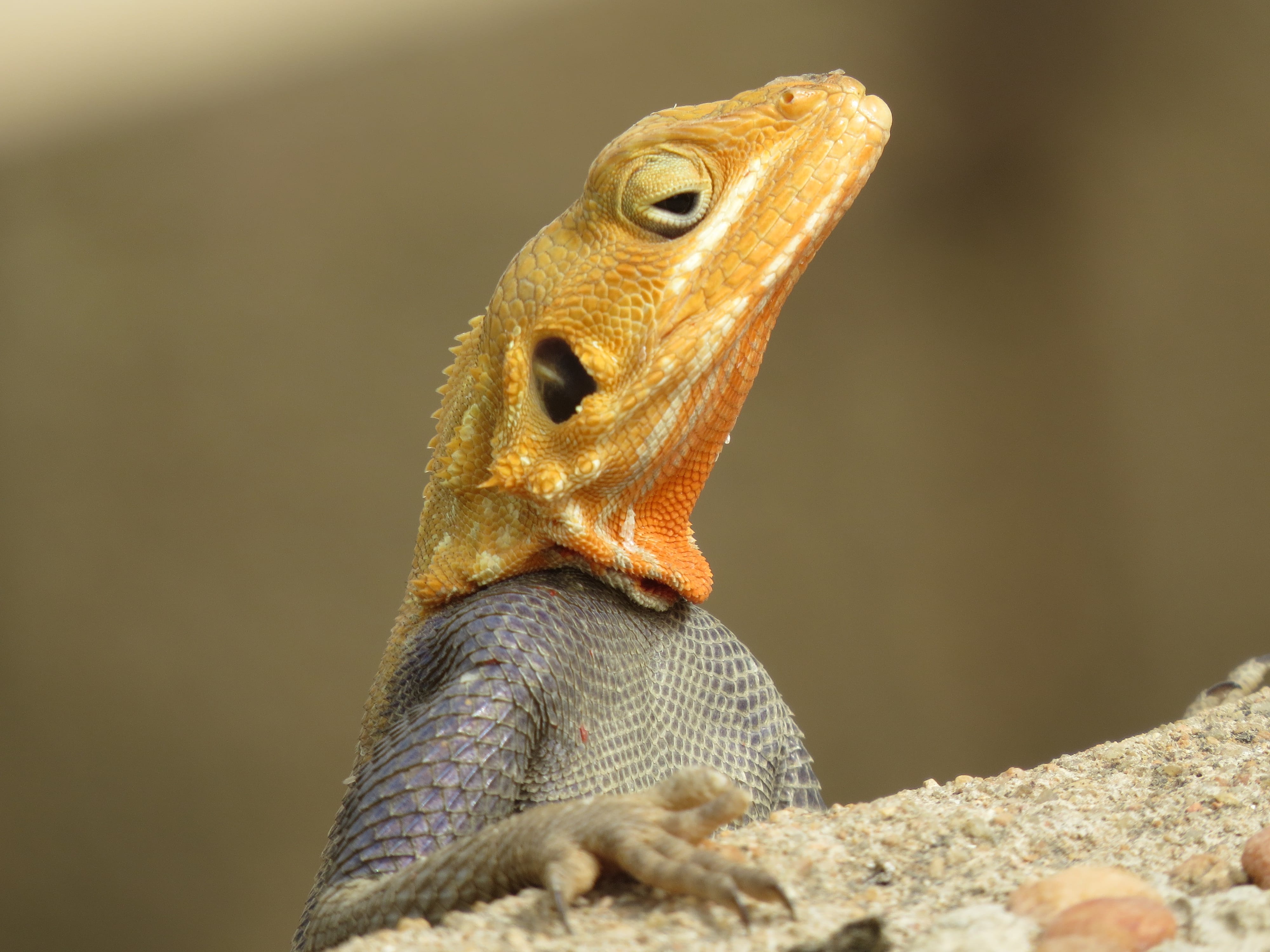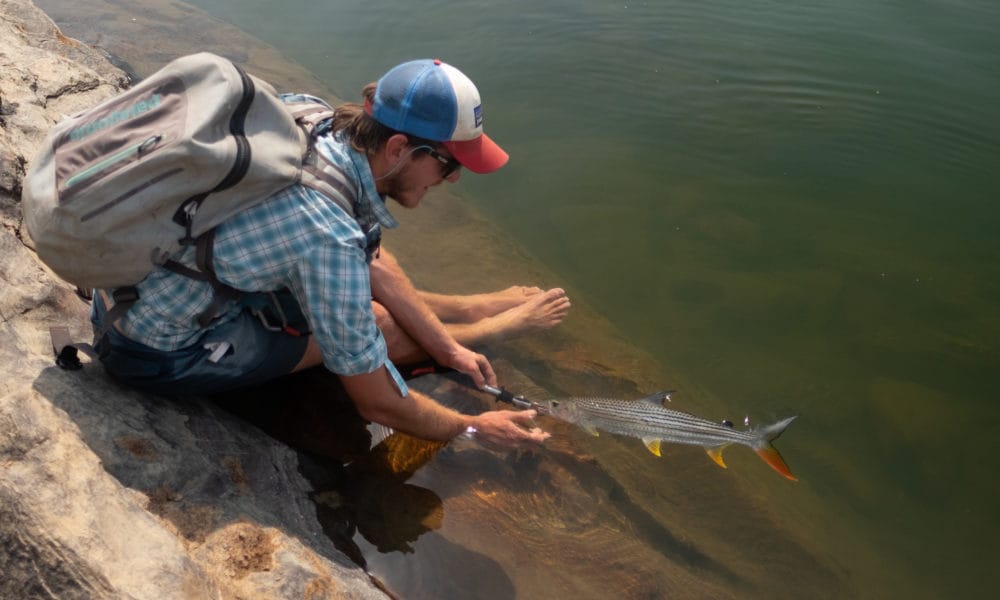February 2019 found Charlotte in Cameroon, part of a select group of anglers in this pioneering season in pursuit of Nile Perch on fly. It is an unknown and untested fishery but in the four short weeks of its first season, the scope of the fishery became more apparent with each group of anglers. This is the second part of Charlotte’s trip report and if you haven’t read the first, click HERE.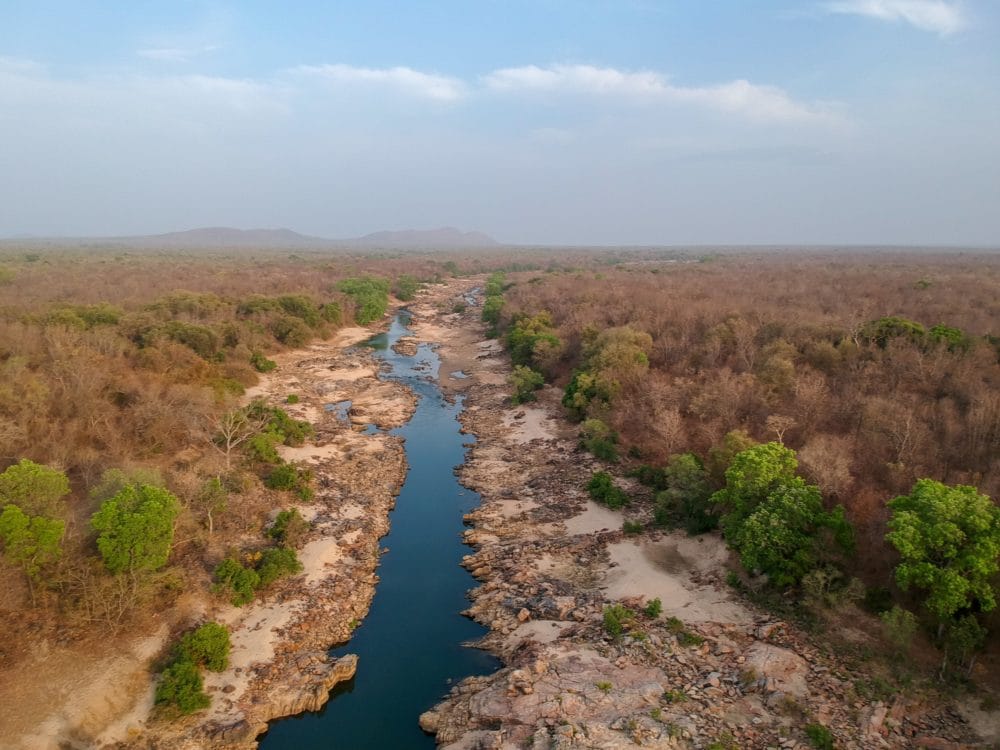
With the first half of the week behind us, we were depressingly on the downhill slope towards heading home. We still had plenty of fishing to do and whilst the body might have been a bit stiffer than it was at the beginning of the week, there was plenty of unfinished business to attend to. Moving down to a section that we’d not previously fished, Gordon, Chris, Martin, Greg and BeBe headed one direction while Stu and I went the other, our focus very much on the tigerfish while the others were on a species hunt. Baloo stayed behind to whittle.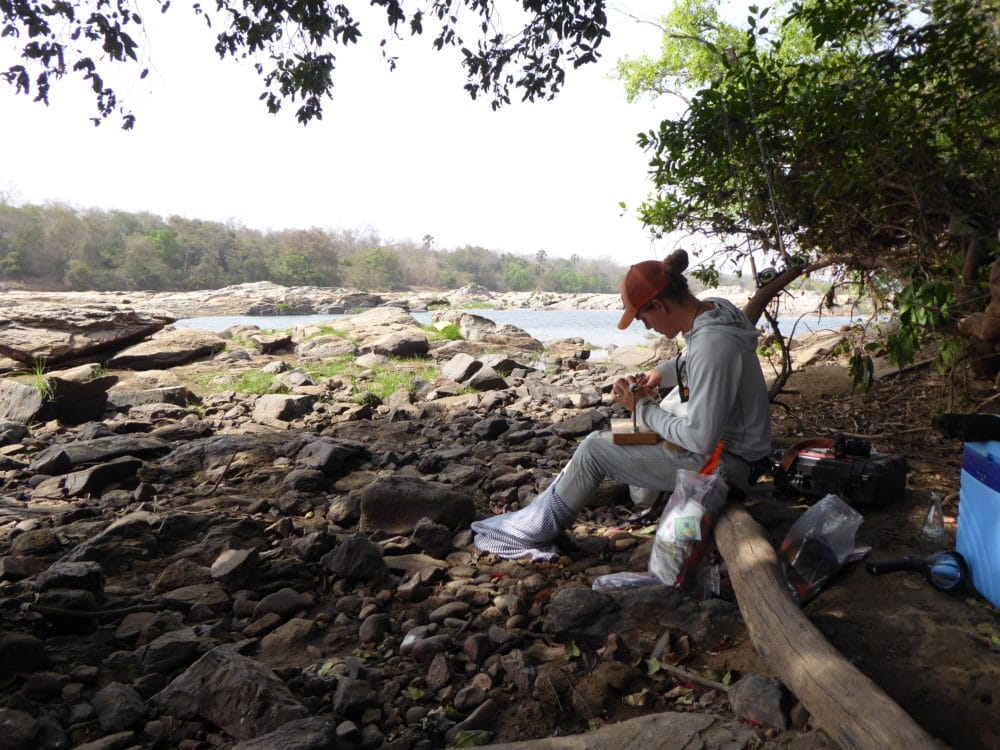
While Cameroon tigers came in hot, they are equally quick to retreat. They certainly didn’t settle in the same way that the tigers I’d encountered in Tanzania did and Greg’s earlier advice that you had two strikes or were out, seemed bang on the money. Stu and I held back from the edge, not wanting to spook the fish; the water was very clear, moving through at good rate but not too fast to be able to effectively strip. I cast and stripped, recast and stripped faster. Nothing. Recast a little higher up and stripped then repeated the process again. We changed fly as the original obviously wasn’t flavour of the morning and repeated the process. The stretch of water we were fishing wasn’t huge, it wasn’t wide or particularly deep but we could see a good number of fish so carried on. Moving forward slightly, I recast and on a somewhat bored strip, had an almighty BANG. It went off like a rocket, keeping the rod low as the line tightened, I prayed that this one would stay attached. After some heart stopping moments, Stu was able to bring it in and I had finally managed to land my very first h.brevis and what a beautiful fish it was. The colouring is more subtle than h.vitatus but no less eye catching and they are formidable fighters. I tried to be cool about it but inside, I was leaping about, yelling and hollering in delight …. Stu just grinned at me, gave me a hug and a high five; he knew there was a party going on in my head. 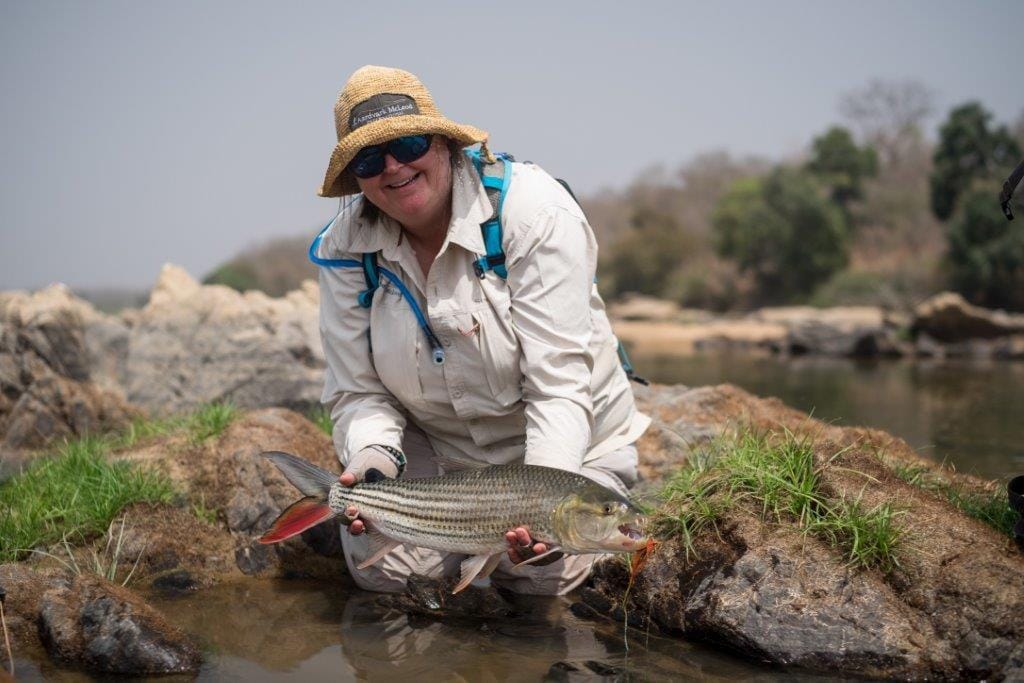 Fish back in the water, fly and leader inspected, on we went. Stu had said earlier that there was something very special ahead and I thought that the water we had just fished was it. No, a little further on we came to a stretch of water that was mind blowing. Crystal clear, with a perfect flow rate and a bed of clean sand, the river had little structure and plenty of fish. I’m not exactly built for stealth so keeping low and keeping quiet were enough of a challenge to keep my mind off the fact that what we were about to attempt was basically upstream dry fly fishing …. for tigerfish. Casting upstream, letting the fly drift back towards us, just keeping contact, there was no reaction. I recast, this time keeping more tension but not making the fly move. Some of the smaller fish reacted, rising up slightly and then settling back into their lie. I repeated this a couple of times but with no reaction, the next cast was more square so I could strip it back, to move the fly faster. There was a definite reaction, with the tigerfish moving to follow the fly, staying deep but watching it all the way. Deep breath. Try again, repeat the process with a faster strip, more akin to that I use in Tanzania. This time another follow, shallower and faster. Next strip was fast, and produced a fast, rising follow. Finally, having reached my max stripping speed and not reached the point where I could provoke a take, I passed my rod to Stu. He encountered the same response, resorting eventually to a GT style strip … which emptied the pool. Somewhere between my max strip speed and Stu’s lies the sweet spot but it wasn’t our day to find it so we moved on. I never once imagined I’d ever be casting to tigerfish in water so clear that I could see their every reaction – I could easily have been on one of our Chalkstream beats.
Fish back in the water, fly and leader inspected, on we went. Stu had said earlier that there was something very special ahead and I thought that the water we had just fished was it. No, a little further on we came to a stretch of water that was mind blowing. Crystal clear, with a perfect flow rate and a bed of clean sand, the river had little structure and plenty of fish. I’m not exactly built for stealth so keeping low and keeping quiet were enough of a challenge to keep my mind off the fact that what we were about to attempt was basically upstream dry fly fishing …. for tigerfish. Casting upstream, letting the fly drift back towards us, just keeping contact, there was no reaction. I recast, this time keeping more tension but not making the fly move. Some of the smaller fish reacted, rising up slightly and then settling back into their lie. I repeated this a couple of times but with no reaction, the next cast was more square so I could strip it back, to move the fly faster. There was a definite reaction, with the tigerfish moving to follow the fly, staying deep but watching it all the way. Deep breath. Try again, repeat the process with a faster strip, more akin to that I use in Tanzania. This time another follow, shallower and faster. Next strip was fast, and produced a fast, rising follow. Finally, having reached my max stripping speed and not reached the point where I could provoke a take, I passed my rod to Stu. He encountered the same response, resorting eventually to a GT style strip … which emptied the pool. Somewhere between my max strip speed and Stu’s lies the sweet spot but it wasn’t our day to find it so we moved on. I never once imagined I’d ever be casting to tigerfish in water so clear that I could see their every reaction – I could easily have been on one of our Chalkstream beats. 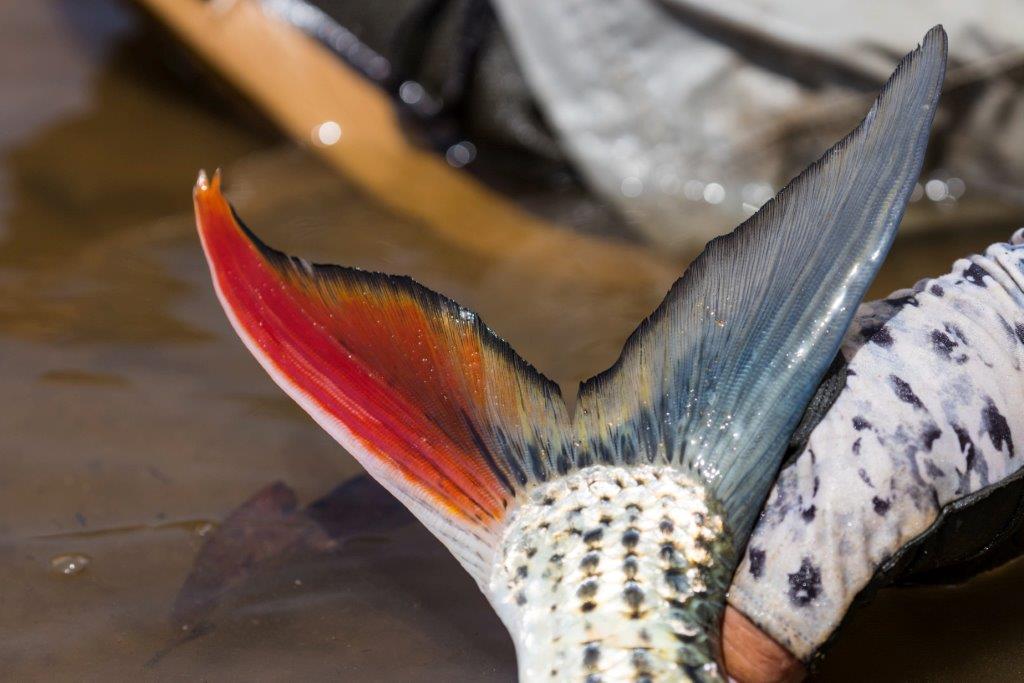
On we went, again keeping back and looking at clear water with some very big fish. Sneaking up behind one worthy of being called ‘Bismark’, Stu suddenly stopped and told me reel in, we were heading out. Puzzled I looked up, saw nothing but followed where Stu was pointing. All I saw was several big rocks and some egrets. Slowly I realised that it was unlikely that the little rock, on top of a big rock, would be moving if it was a rock and a hippo came into focus. Snoozing in the sun, with only its feet in a trickle of water, it did “rock” exceptionally well. We retreated back to base; I chilled, Stu tied flies and we waited for the others to join us. It was a good day on tigerfish all round with all three species landed and Martin cashing in with a very hefty h.brevis.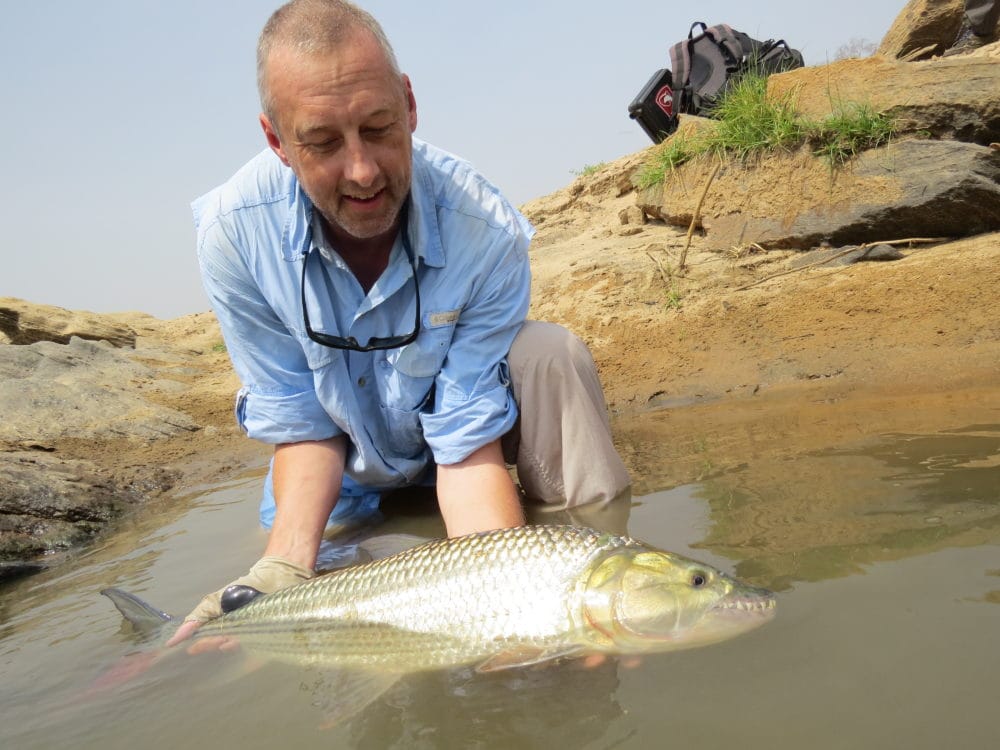
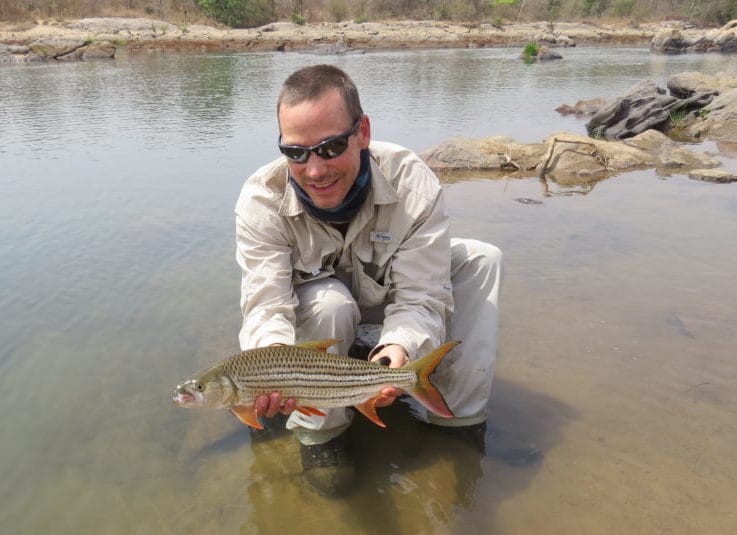
Dusk on the water is really very special; there’s a brief point when all is quiet as the day shift hands over to the night shift. We had one incredibly odd night when it stayed quiet. The hippos weren’t moving around, the chicadas were silent and the Nile perch weren’t interested. As we’d had no hits at all, we retreated early and I have to say, it was good to be back in camp at a decent hour.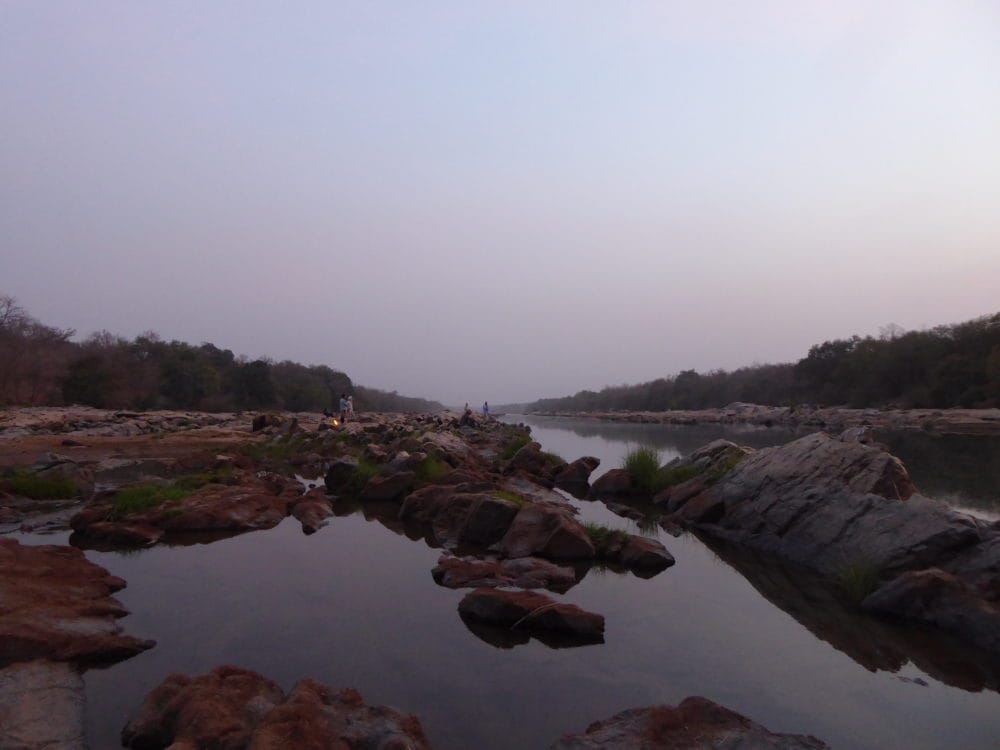 When we returned to what I called the “canal” it couldn’t have been more different. The bush was alive andf the hippos were moving. This elicited the occasional shout of “lines out” as one barrelled on through and the Nile perch were feeding. I was the quietest of the four anglers with only a few enquiries. Gordie, Chris and Martin all had fish on, and fish off. In the darkness, sound seems amplified and when Martin shouted “IN” all I could hear was his line ripping through water. Reel screaming, line running, Martin was hanging on as his leviathan screamed upriver. Martin was fighting hard to stop it or turn it, doing everything that he could to keep the fish away from the freshwater oyster beds. The oysters are incredibly abrasive and having leader or a line run over an oyster bed is a fast way to disaster. One minute your fish is on, and poof, the next it’s gone. Losing a big fish is gut wrenching but it seems worse when it’s someone else who has lost it; perhaps it is because you know there’s nothing you can say that will help. When the fish are on, they are on so rule of thumb is that when one gets a hit, you all redouble your efforts. My quiet trend continued. I heard Gordie swear a few times and then Chris shouted “IN”. It was like groundhog day; line ripping off the water, reel on overdrive. Chris battled to keep his fish from running too far or too deep. All I could see in the tiny light of his headtorch was Chris teetering on his rock, keeping the pressure on. In what seemed very short order, Chris landed the biggest Nile perch of the week at 119 cm. Can’t argue with that smile.
When we returned to what I called the “canal” it couldn’t have been more different. The bush was alive andf the hippos were moving. This elicited the occasional shout of “lines out” as one barrelled on through and the Nile perch were feeding. I was the quietest of the four anglers with only a few enquiries. Gordie, Chris and Martin all had fish on, and fish off. In the darkness, sound seems amplified and when Martin shouted “IN” all I could hear was his line ripping through water. Reel screaming, line running, Martin was hanging on as his leviathan screamed upriver. Martin was fighting hard to stop it or turn it, doing everything that he could to keep the fish away from the freshwater oyster beds. The oysters are incredibly abrasive and having leader or a line run over an oyster bed is a fast way to disaster. One minute your fish is on, and poof, the next it’s gone. Losing a big fish is gut wrenching but it seems worse when it’s someone else who has lost it; perhaps it is because you know there’s nothing you can say that will help. When the fish are on, they are on so rule of thumb is that when one gets a hit, you all redouble your efforts. My quiet trend continued. I heard Gordie swear a few times and then Chris shouted “IN”. It was like groundhog day; line ripping off the water, reel on overdrive. Chris battled to keep his fish from running too far or too deep. All I could see in the tiny light of his headtorch was Chris teetering on his rock, keeping the pressure on. In what seemed very short order, Chris landed the biggest Nile perch of the week at 119 cm. Can’t argue with that smile.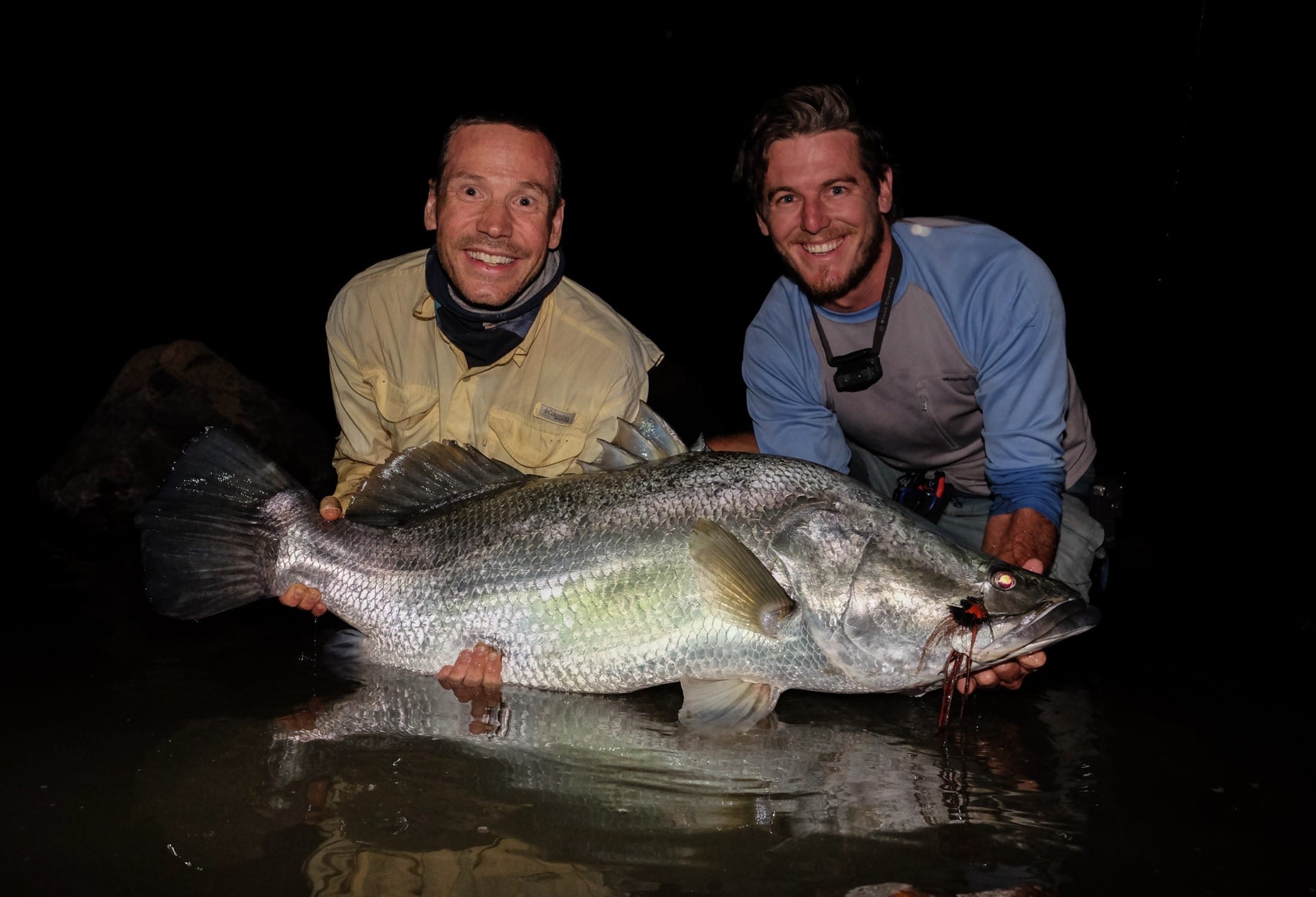
Gordie had been suspiciously quiet and then Greg pointed out from the darkness, “you’re not going to catch anything if your line isn’t in the water”. By this point in the week, Gordie was suffering with a very heavy cold and was fishing lightly; Greg’s pithy comment obviously did the job as he was rewarded not long after with this handsome fella.
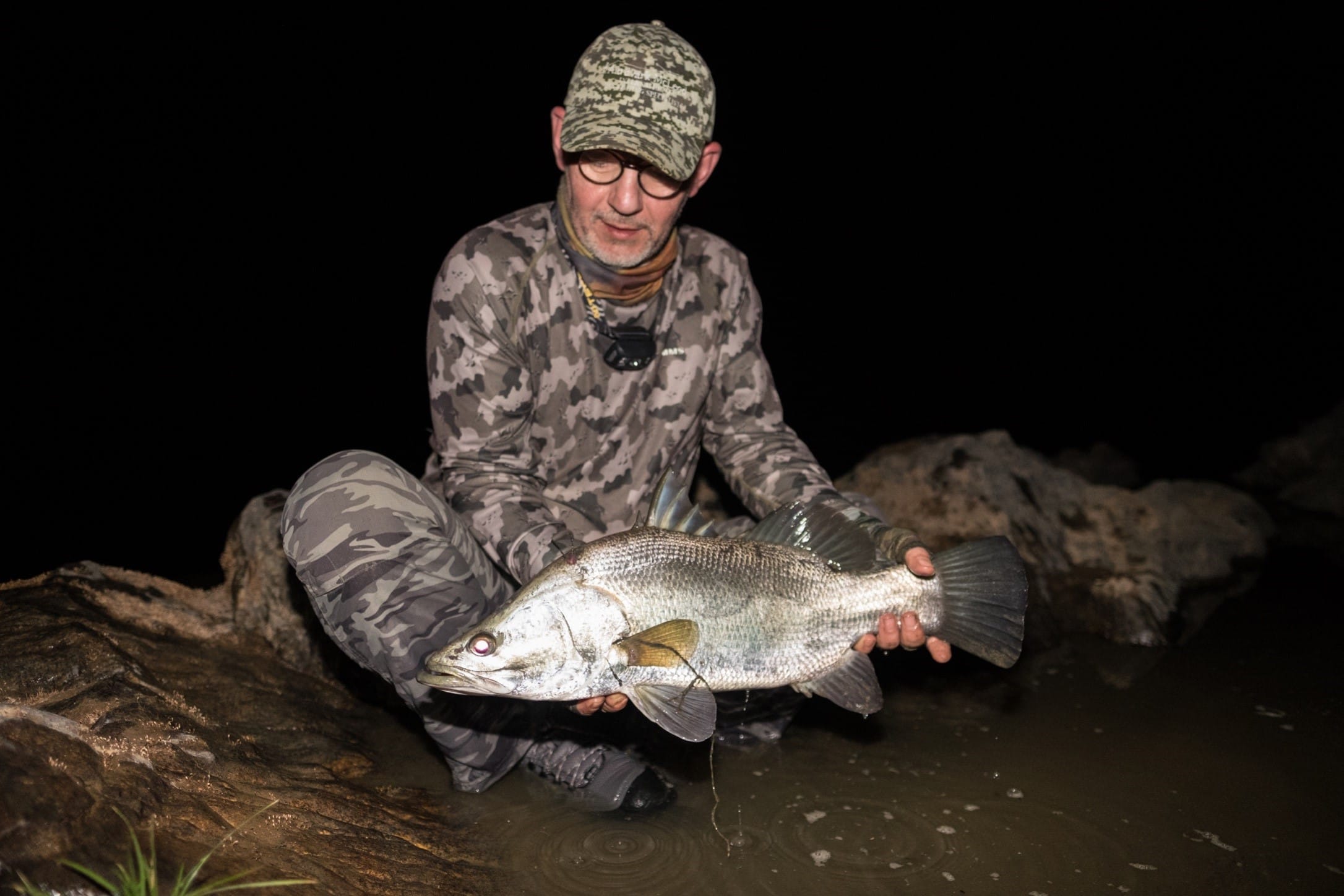
I’ve been asked a fair bit what it was like, fishing for Nile perch after sundown. Well, can you see anything below? No? Neither could I. An amazing experience, fishing in the dark definitely had me focussing on what I was doing. I wasn’t distracted by birds or wildlife, wanting to take photos or being nosey and watching everyone else. I was absolutely focused on what I was doing; feeling my cast and in tune with my line in a way that normally escapes me; I am very easily distracted. 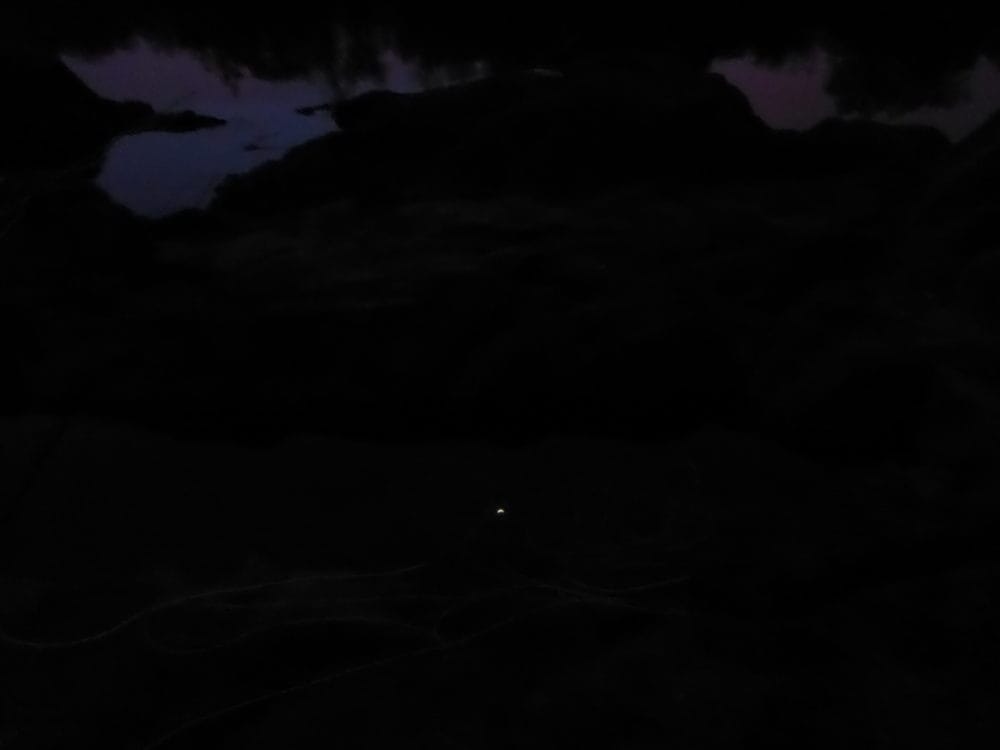
My last evening sessions didn’t add to my Nile perch tally for the week but with three fish over a meter I counted myself very fortunate indeed …. it is rare that I fish well at the beginning of the week, normally I’m sweating it by the Wednesday and it all comes together at the umpteenth hour; it was a nice change to have done it the other way around for once.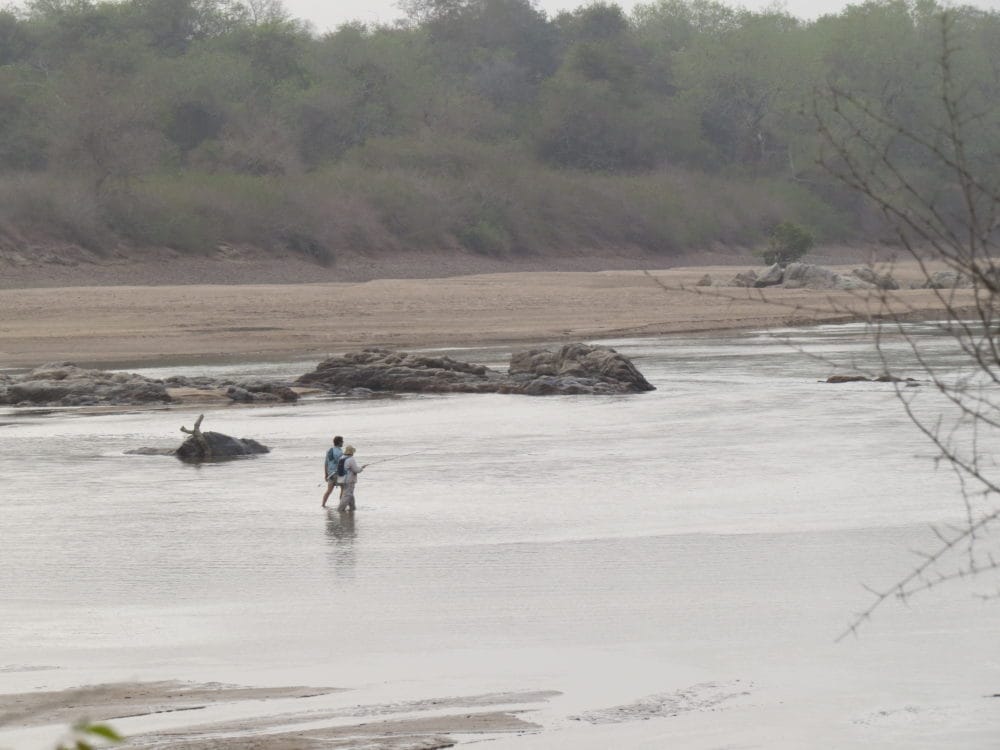
Final afternoon and one last chance to fish. Greg and I went off on a last session for Cameroon tigerfish. Sliding down the bank, we made our way down river, staying well back on the sand so as not to spook the fish. It was a surreal experience; flats wading in Africa. Fishing over very skinny water into the deeper, faster channels. These pockets are stuffed full of fish but they are hard to hook and even harder to keep on. We worked our way through the flies we had with us, settling on a Wooley Bugger of all things that was rapidly reduced in size by the near constant strikes from the h.brevis and h.forskalii. Many hits, many losses and some landings later, it was time to head back. As we made our way back up to camp, we saw prints that Greg though were adult and juvenile elephant, a rarity to see here and uplifting because of that. Stu had walked down to join us and as the three of us walked back towards camp, hand on heart I could say it was end of the best week away I have ever had. It even beat the Burning Man festival I survived in my 20s. It seemed Cameroon had one last physical challenge for me; getting back up to camp. Stu and Greg did it in about 5 strides; I took a little longer, with a lot less grace and much more dirt.
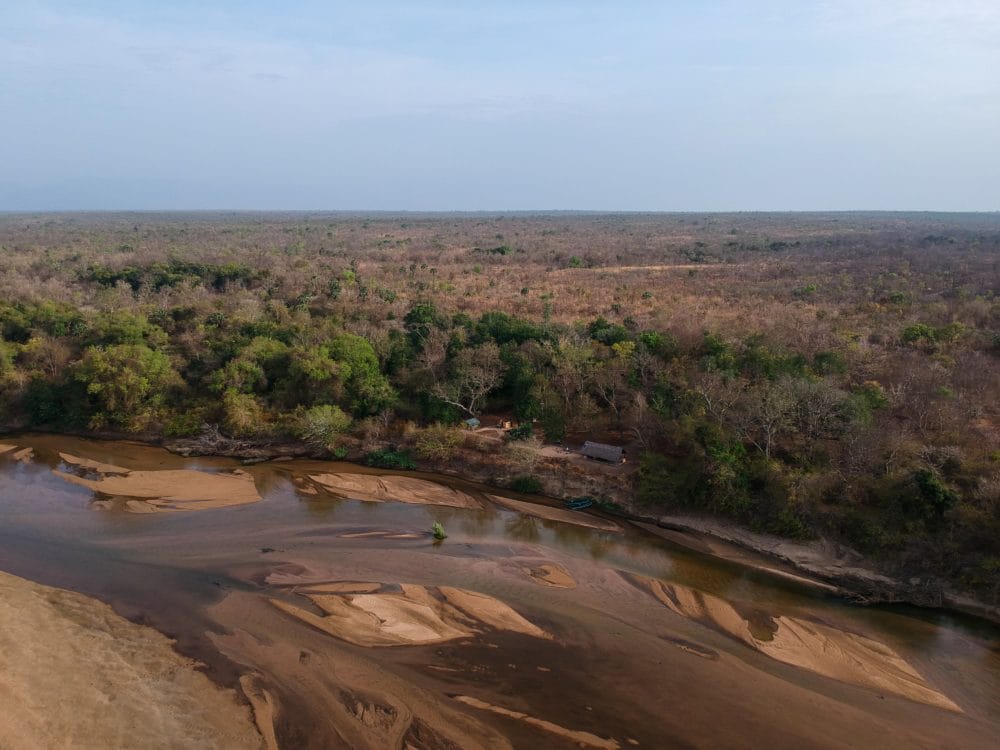 Leaving camp the following morning, we emerged from the quiet of the bush …. into school sports day, very nearly ruining the white lines at the end of the 100 meter lanes. After the tranquillity of camp and on the river, the sheer volume and number of people was a shock to the system but none of us could fail to be lifted by the sheer enjoyment of the crowds.
Leaving camp the following morning, we emerged from the quiet of the bush …. into school sports day, very nearly ruining the white lines at the end of the 100 meter lanes. After the tranquillity of camp and on the river, the sheer volume and number of people was a shock to the system but none of us could fail to be lifted by the sheer enjoyment of the crowds.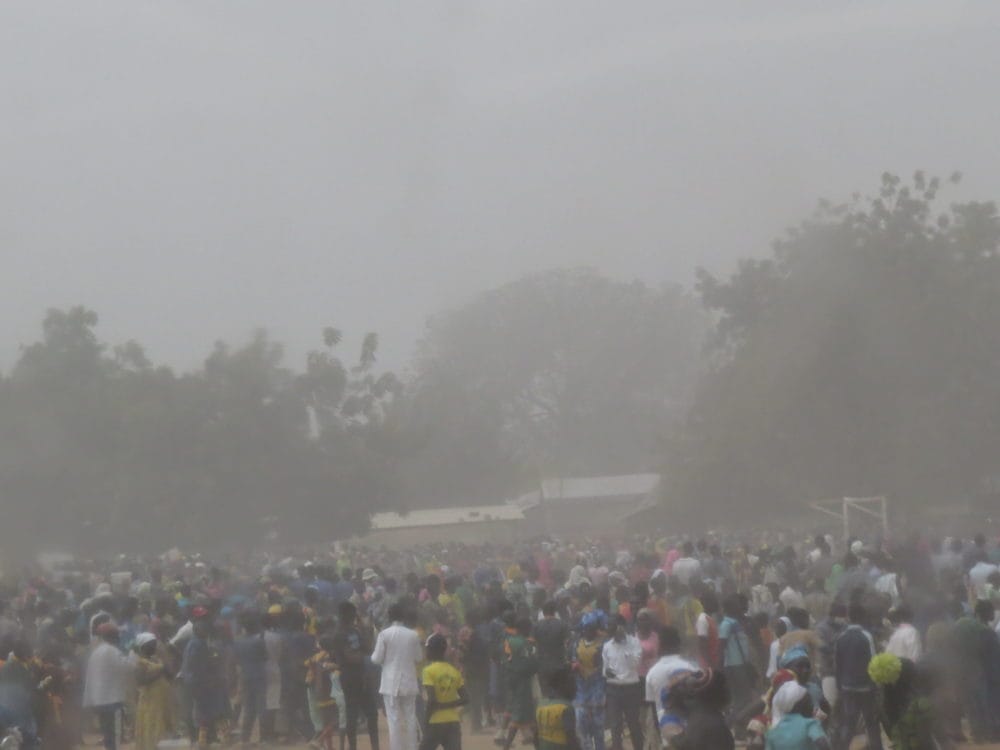 The journey back to Douala and to the airport was more of the same that we encountered on the way in; lots of queuing, delayed flights and the added excitement of Gordie’s bag not arriving. Turned out the following morning that it was downstairs next to the conveyor belt; it was obviously one bag too many for the baggage handler to cope with. Or perhaps he felt it was just too disreputable to move. Finally homeward bound, we did some rather belated present shopping at the airport, stuffing it all in to the small spaces in our backpacks. During security checks, Gordie’s camera had to be excavated twice resulting in his wooden hippo being unable to fit back in. It was handed over to me, with a firm Glaswegian reminder not to forget to give it back.
The journey back to Douala and to the airport was more of the same that we encountered on the way in; lots of queuing, delayed flights and the added excitement of Gordie’s bag not arriving. Turned out the following morning that it was downstairs next to the conveyor belt; it was obviously one bag too many for the baggage handler to cope with. Or perhaps he felt it was just too disreputable to move. Finally homeward bound, we did some rather belated present shopping at the airport, stuffing it all in to the small spaces in our backpacks. During security checks, Gordie’s camera had to be excavated twice resulting in his wooden hippo being unable to fit back in. It was handed over to me, with a firm Glaswegian reminder not to forget to give it back.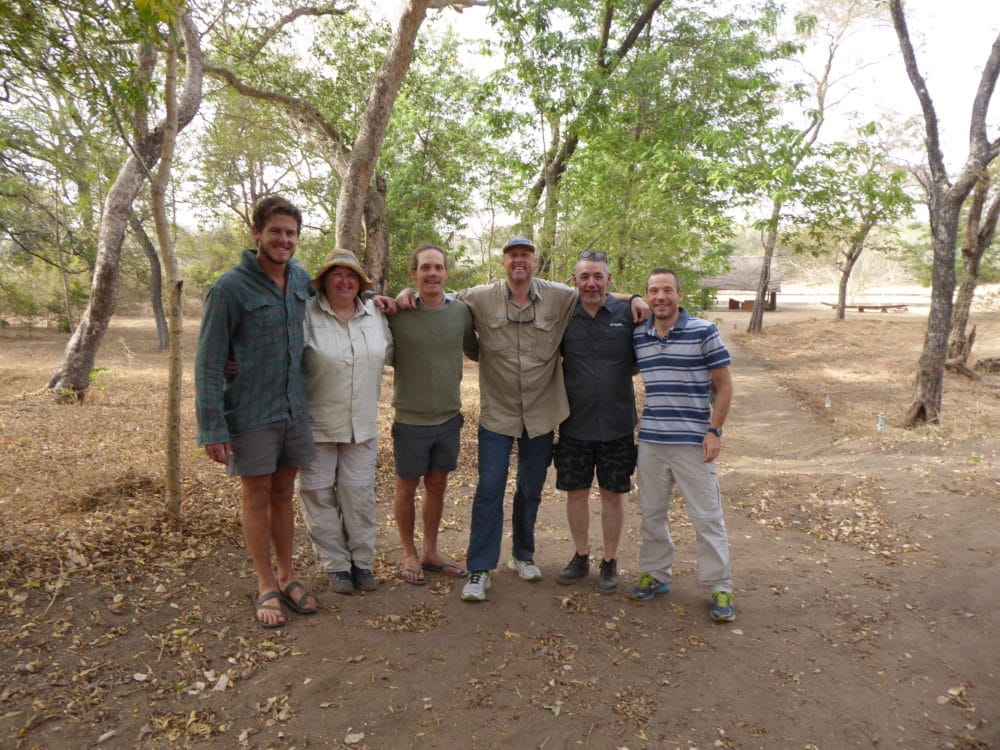
“Well”, I thought, “where Cameroon failed to physically beat me, Air France may well succeed”. What I didn’t know at the time was that, at the other end of the row, Gordon was making his peace with his maker and trying to set up a gig with Lemmy. I have never, ever, experienced turbulence like it and for what seemed like hours but probably wasn’t long at all, we went up, down, left and right. Just to round off the flight, as we approached Paris we heard “Plze turn off ze phone and ze liptop. We will be landing wiz ze autopeelot as ze fog is zo zick we cannot land normalalament”. Fabulous.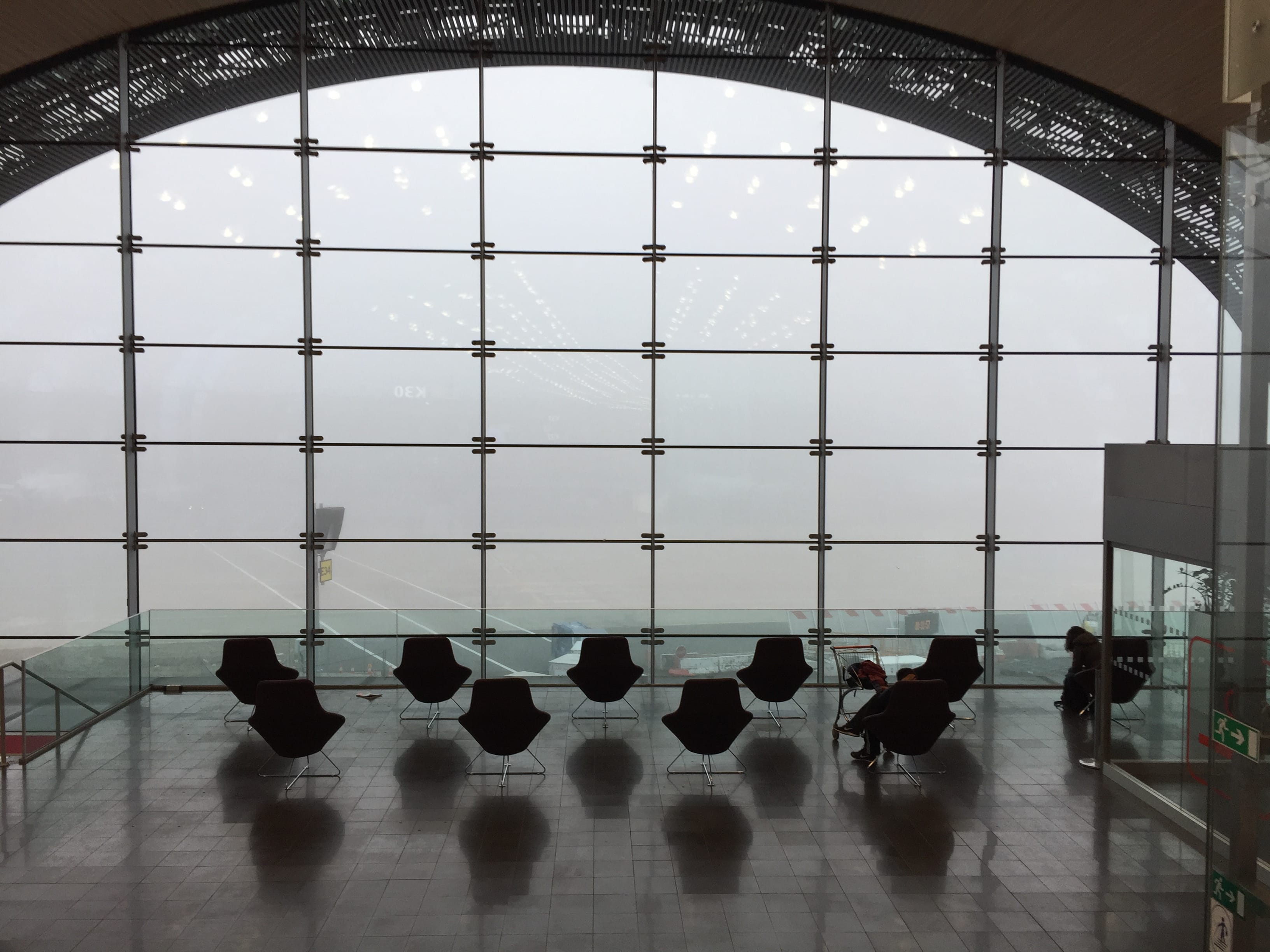
Reunited outside of the plane, Gordon and I walked along in silence for a time. “I thought that was it”. “F**k me, so did I”. Enough said. By this time, we had been on the move for nearly 72 hours and were operating several levels below normal. Gordon went off to sniff out a smoking lounge while I found the gate, tried to sit down with my backpack on, fell off my chair, cracked my knee and spilt my coffee.
A while later, and as the fog stubbornly refused to lift, Gordon said “shall we go back?” My very mumbled reply was “yes, but not next week, I need to sleep”. Saying goodbye, I trotted off for my flight home which I spent in a catatonic haze. Staggering through Heathrow, I managed the automated passport control, found my bag, found my ride home and made it to my front door as I hit the 82 hour mark.
I still had Gordon’s hippo.
I had waited so long for this trip, did it live up to the expectation? Yes and in many ways, it exceeded expectations and has left me really wanting to go back. There is so much more to the fishery than what I focused on as I spent my time on tigerfish and Nile perch. Fishing for the Nile perch was much more fun than I thought it would be but I had no benchmark for the species and I’d never fished in the dark before. I couldn’t have asked for a nicer group of people to spend a week with and I sincerely hope that we can all fish together again in the not too distant future. Full credit to Edward Truter and the Tourette team for continuing to hunt out these wild and remote spots in the world. They can only benefit from the conservation protocols that Tourette are able to put in place as a result of having travelling anglers like us, visit and fish.
A huge thank you to everyone for their images, particularly Andrew Luedke who takes such amazing aerial shots. Finally, if you are looking for a travelling book look out Edward Truter and Martin Rudman’s book, “Fishing Stories for Africa”.
The first part of Charlotte’s trip report is online HERE.
If you would like some details then please contact Charlotte Chilcott. Alternatively call the office on to +44(0)1980 847389 for more details